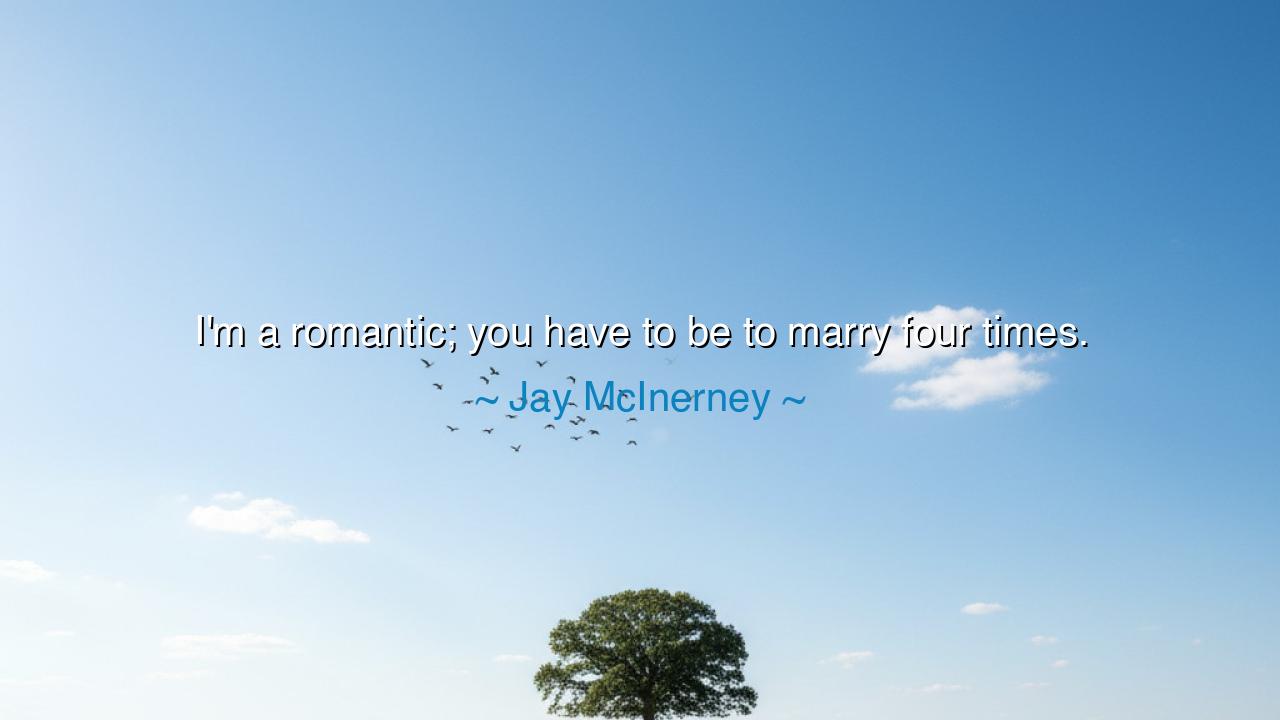
I'm a romantic; you have to be to marry four times.






In the words of Jay McInerney, "I'm a romantic; you have to be to marry four times," we encounter a reflection on the nature of love, desire, and the pursuit of the ideal. At first glance, such a statement may seem to speak to the fickleness of romance, to the perils of seeking out love again and again, despite previous heartbreak. But McInerney’s words go deeper, revealing a truth about the human condition: that romance is not merely a fleeting pursuit, but a profound drive—an unyielding belief in the possibility of connection, no matter the trials and tribulations along the way.
The ancient Greeks understood love in its most complex forms. Plato in his dialogues, particularly in the Symposium, portrayed love as not merely an attraction between bodies but a longing for something greater, something transcendent. The soul’s desire for beauty, truth, and immortality was often expressed through the passionate pursuit of another person. Similarly, Aristotle defined love as an act of virtue and mutual respect, suggesting that true affection is grounded not in fleeting pleasure but in a deeper connection. McInerney’s repeated marriages, then, are not simply the actions of a man who loves lightly or casually, but of one who believes in love’s potential to redeem and transform, even after it has failed him in the past.
To marry four times is, in McInerney’s context, not an expression of naiveté, but of hope. The romantic is one who dares to believe, time and again, that love can provide meaning, can heal wounds, and can bring purpose to life. This type of belief echoes the ancient heroes who, despite numerous trials and suffering, continued to seek their ideal. Take, for instance, the story of Odysseus, whose long journey home to Ithaca was marked by countless hardships, battles with gods and monsters, and temptations to stray from his love for his wife Penelope. Yet, despite all odds, Odysseus never gave up on returning to her, demonstrating the unwavering romantic spirit that resides in all of us—the belief that true love is worth the struggle, worth the sacrifice.
Similarly, Romeo and Juliet, the iconic lovers of Shakespeare’s tragedy, represent the romantic spirit that McInerney speaks of. Their love, though doomed and fraught with tragedy, is the epitome of idealism. They sought each other out against all obstacles, believing that love was more powerful than any force, even death itself. Romeo, in particular, represents the romantic ideal: a young man willing to risk everything, even his life, in the name of love. McInerney’s multiple marriages, then, can be seen as a contemporary version of this romantic quest—a refusal to let go of the ideal, even after each attempt does not end in the way one might hope.
In the context of McInerney’s life, his quote becomes a testament to the resilience of the romantic spirit. To experience love and heartbreak repeatedly, to be disappointed and yet continue to seek, speaks to a profound strength. In ancient Rome, figures like Cicero and Caesar experienced both personal loss and political failure, yet they never ceased in their pursuits—be it for power, fame, or love. Their journeys, though marred by conflict, were defined by the undying hope that great things could still be achieved. McInerney’s marriages, too, are a reflection of that drive, the willingness to continue chasing what may seem an elusive or impossible dream.
The lesson McInerney offers, then, is one of persistence in the face of failure. In love, as in life, we are often confronted with disappointments. Yet, as McInerney reveals, it is not the failure that defines us, but our ability to continue believing in the possibility of something greater. To love again, to take risks again, to open oneself to vulnerability again—these actions require great courage and hope. It is this courage that makes the romantic spirit so powerful, for it dares to believe in the possibility of beauty and connection, even when the world seems filled with obstacles.
In your own life, take McInerney’s words as an encouragement to keep striving for what matters, even when it seems unattainable. Love may not always yield the results you hope for, but it is the act of loving, of continuing to seek that connection, that truly defines us. Much like the ancient heroes, the key is to remain faithful to the journey—to recognize that the quest for meaning, for purpose, and for connection is never truly over. Whether in love, in career, or in personal growth, embrace the romantic spirit: believe that the struggle is worth it, and never lose faith in the possibility of finding what you seek.






AAdministratorAdministrator
Welcome, honored guests. Please leave a comment, we will respond soon